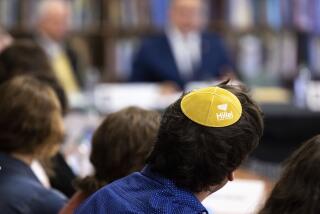Agency Spells Out What Sex Harassment Is, Isn’t
- Share via
WASHINGTON — Johnathan Prevette, the first-grader punished last year for kissing a girl at school, can put his mind at ease. The Education Department declared Thursday that a peck on the cheek by a 6-year-old falls short of sexual harassment.
Issuing guidelines for schools or colleges that receive federal funds--and most do--the department called upon the “judgment and common sense” of school officials when fighting harassment. The department told officials to consider the alleged offender’s age.
“The factors in the guidance confirm that a kiss on the cheek by a first-grader does not constitute sexual harassment,” the department said, not mentioning Johnathan by name.
“In order to give rise to a complaint . . . sexual harassment must be sufficiently severe, persistent or pervasive that it adversely affects a student’s education or creates a hostile or abusive educational environment,” the guidelines said. “For a one-time incident to rise to the level of harassment, it must be severe.”
Johnathan was separated from his class at Southwest Elementary School in Lexington, N.C., for a day and banned from an ice cream party after he kissed a classmate in September 1996. The case drew worldwide attention, and ridicule, for schools nervous about the strings attached to federal aid. The guidelines also attempted to clarify some other situations:
* “A high school athletic coach hugging a student who made a goal or a kindergarten teacher’s consoling hug for a child with a skinned knee will not be considered sexual harassment,” the guidelines said. However, “a teacher’s repeatedly hugging and putting his or her arms around students under inappropriate circumstances” could be.
* Students who tell gay or lesbian students they’re not welcome at a cafeteria table aren’t sexually harassing them under federal law. Male students who target lesbian students for sexual advances would be harassing them.
* A creative writing class in which students read classic works or student works that are sexually derogatory would be protected.
* A group of male students that targeted a female student on her bus ride home, making sexual comments about her body or following her home, could not be protected.
More to Read
Sign up for Essential California
The most important California stories and recommendations in your inbox every morning.
You may occasionally receive promotional content from the Los Angeles Times.













